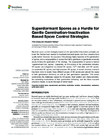Superdormant spores as a hurdle for gentle germination-inactivation based spore control strategies

Open access
Date
2019-01Type
- Journal Article
ETH Bibliography
yes
Altmetrics
Abstract
Bacterial spore control strategies based on the germination-inactivation principle can lower the thermal load needed to inactivate bacterial spores and thus preserve food quality better. However, the success of this strategy highly depends on the germination of spores, and a subpopulation of spores that fail to germinate or germinate extremely slowly hinders the application of this strategy. This subpopulation of spores is termed ‘superdormant (SD) spores.’ Depending on the source of the germination stimulus, SD spores are categorized as nutrient-SD spores, Ca2+-dipicolinic acid SD spores, dodecylamine-SD spores, and high pressure SD spores. In recent decades, research has been done to isolate these different groups of SD spores and unravel the cause of their germination deficiency as well as their germination capacities. This review summarizes the challenges caused by SD spores, their isolation and characterization, the underlying mechanisms of their germination deficiency, and the future research directions needed to tackle this topic in further depth. Show more
Permanent link
https://doi.org/10.3929/ethz-b-000309370Publication status
publishedExternal links
Journal / series
Frontiers in MicrobiologyVolume
Pages / Article No.
Publisher
Frontiers MediaOrganisational unit
09571 - Mathys, Alexander / Mathys, Alexander
Funding
182273 - Isolation and characterization of high pressure superdormant spores (SNF)
More
Show all metadata
ETH Bibliography
yes
Altmetrics


